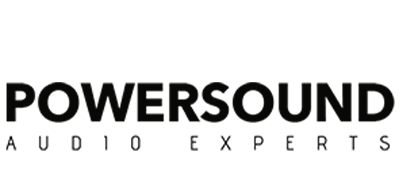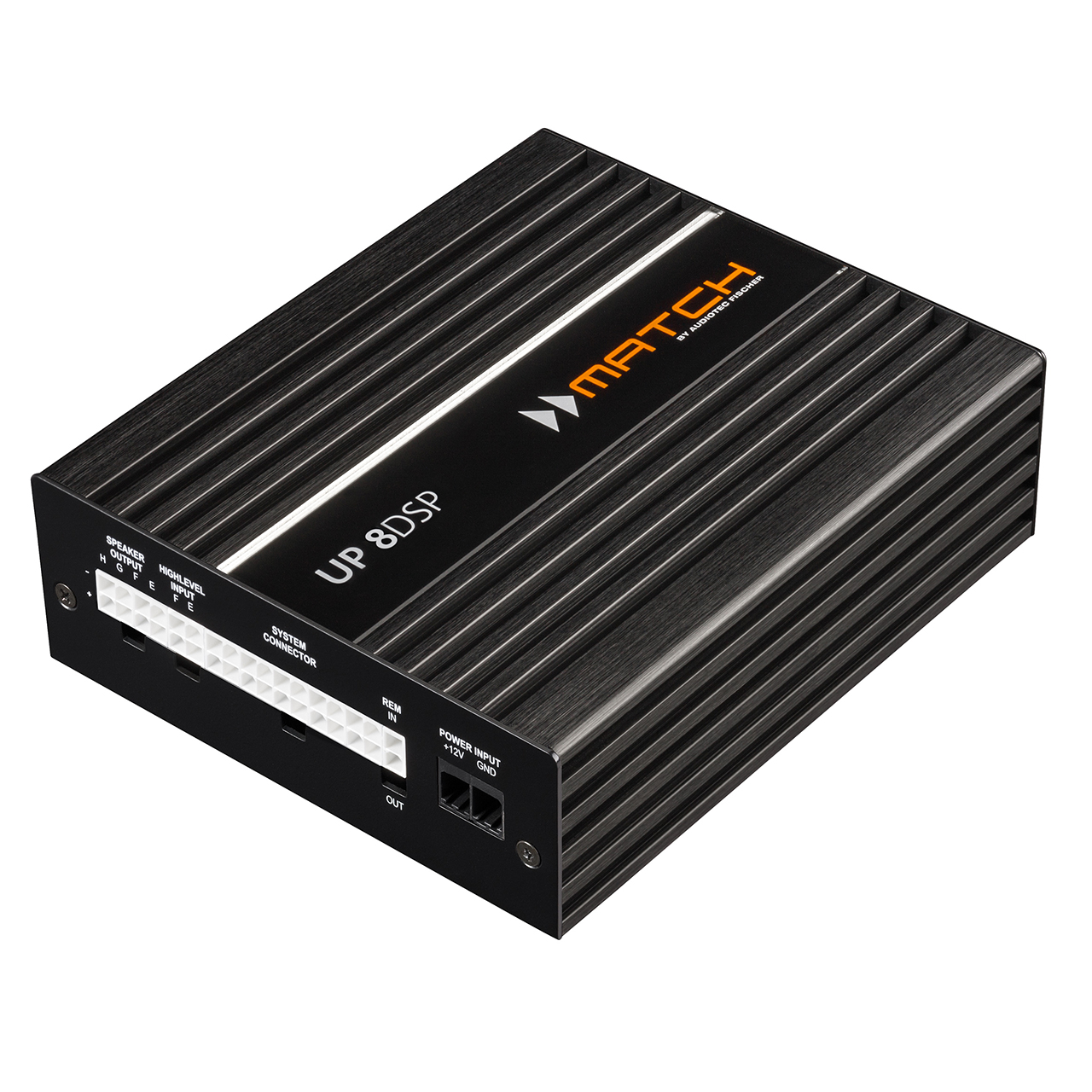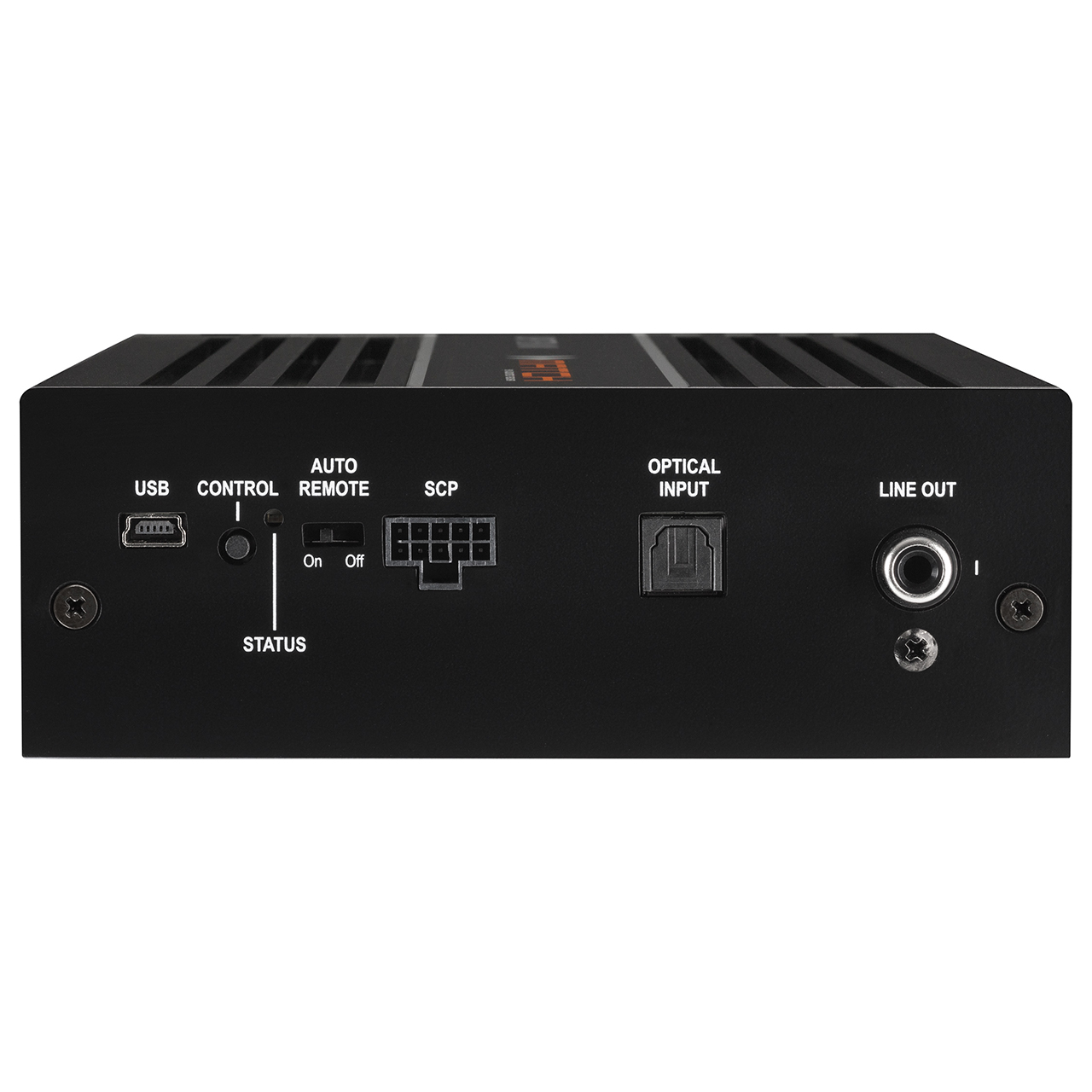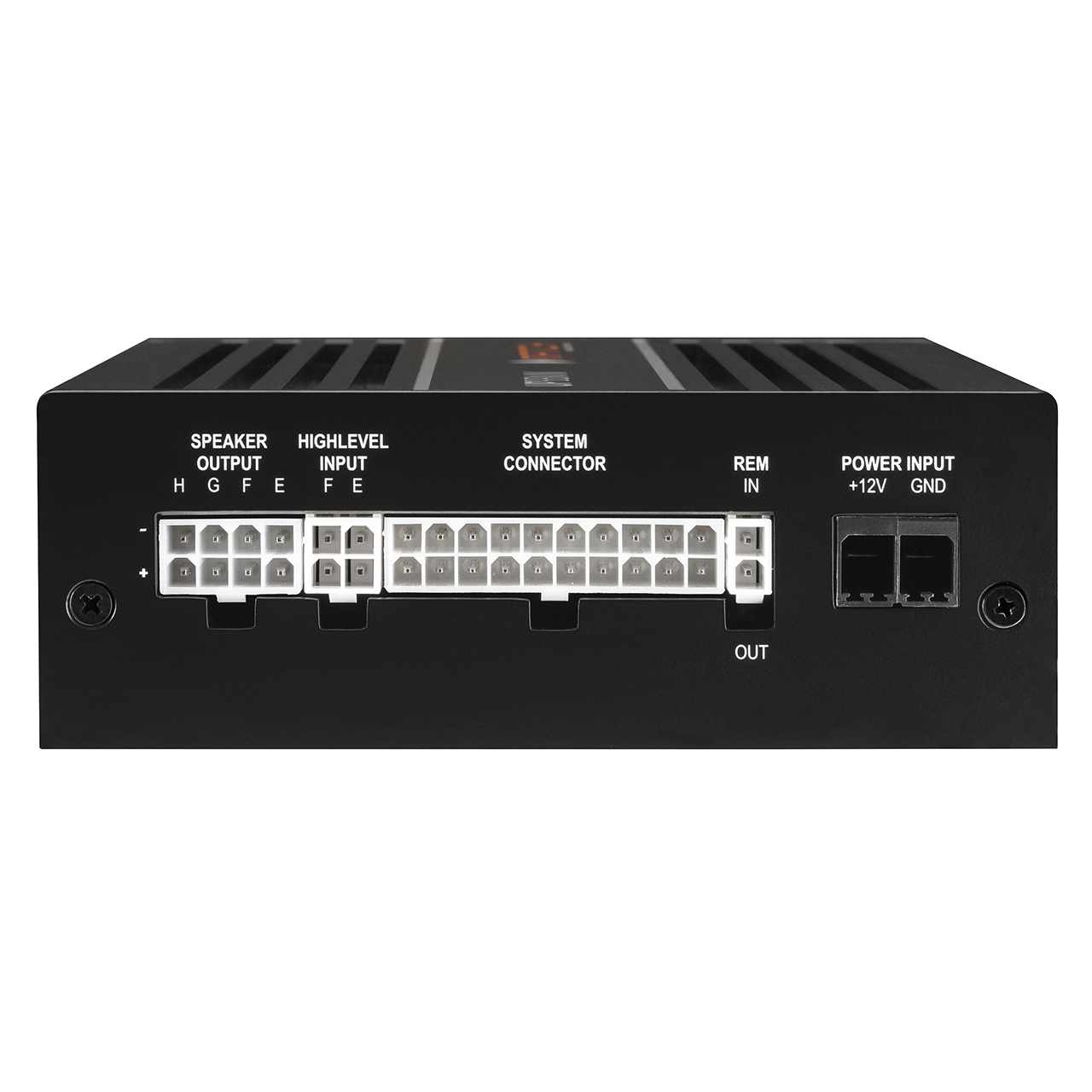MATCH UP 8DSP
The powerhouse for simple OEM integrations
The new UP 8DSP is a true all-rounder that not only delivers unbridled power and dynamics for true hi-fi sound, but at the same time comes with all the prerequisites for easy integration into the vehicle.
Seamless connectivity
With its six high-level inputs, an optical digital input, the MATCH Extension Card slot and many intelligent technologies, such as the proprietary ADEP.3 circuit, the UP 8DSP is perfectly equipped for seamless adaptation to existing multi-channel sound systems.
Furthermore, with a total of eight amplifier channels as well as the additional line output – in combination with the powerful 9-channel DSP – individual speaker configurations can also be realized.
Two amplifier output channels deliver 160 Watts RMS into 2 Ohms – plenty enough for fuelling even large subwoofers.
Virtual Channel Processing – this is how signal routing works today
The optimal adaptation to existing multi-channel sound systems requires sensible management and configuration of the many DSP channels – so it was no question that the UP 8DSP is also equipped with Audiotec Fischer’s innovative virtual channel processing.
Especially when front, rear and center systems are split into multi-way systems, conventional routing concepts quickly reach their limits, both in terms of implementation and usability. The multi-stage “Virtual Channel Processing”, in conjunction with the recognized user-friendly DSP PC-Tool software makes it easy to map even highly complex system configurations and to freely assign our proprietary FX sound features. Additionally, thanks to its generous number of channels in combination with the optional MEC ANALOG IN module the UP 8DSP is also a prime example for applications where 1 to 1 routing (IOR) makes sense.
ACO – Advanced 32 Bit CoProcessor Plattform
Of course, the UP 8DSP is equipped with our proprietary 32 Bit ACO platform, which doesn’t just take over all control tasks ultra-fast, but also handles a bunch of audio functions: fantastic sound effects such as Augmented Bass Processing or Real Center are implemented as well as a channel-separated Input EQ including Input Signal Analyzer (ISA) for easy analysis and compensation of input signals of OE radios, which already include a sound setup by default.
Compact dimensions
Despite its wide feature set and beefy output power of 6 x 65 Watts at 4 Ohms plus 2 x 90 / 160 Watts at 4 / 2 Ohms, the UP 8DSP comes – as usual for a MATCH amplifier – in a very compact design, so that it can be installed even in confined spaces without any problems.
DSP PC-Tool 5 feat. TuneEQ – Powerful features for the ultimate sound experience
Of course, the MATCH UP 8DSP can be easily configured via our new, professional and exceptionally intuitive DSP PC-Tool 5. The familiar, numerous setting options leave nothing to be desired and guarantee an extremely precise sound adjustment even for complex system configurations. And thanks to the new, proprietary TuneEQ function for automated frequency response correction, you also save a lot of time when optimizing your sound.
Features
- Ultra efficient 8-channel amplifier with 1-channel line output and 9-channel DSP
- Perfect for upgrading multi-channel factory sound systems
- Optional cable harnesses for easy integration into existing multi-channel factory sound systems
- Extremely powerful 64 Bit “fixed point” Audio DSP
- ACO – Advanced 32 Bit CoProcessor platform for extended feature set
- ISA (Input Signal Analyzer) and InputEQ for easy analysis and compensation of input signals
- Proprietary TuneEQ function for automated adjustment of the output equalizers
- SFX (DSP Sound Effects) – Augmented Bass Processing, RealCenter & Co.
- Smart 6-channel highlevel input with ADEP.3 circuit
- 1 to 1 Input / Output Routing (IOR) in combination with the optional MEC ANA-LOG IN module – same number of highlevel inputs and amplifier outputs
- VCP (Virtual Channel Processing) allows even more flexible configuration for highly complex sound systems
- MATCH Extension Card slot (MEC) for system expansions like Bluetooth® HD Audio Streaming, High Resolution Audio Streaming via USB etc.
- Optical input in SPDIF format with sampling rate between 12 and 96 kHz
- Mono RCA output for the connection of an external amplifier e.g. subwoofer amplifier
- SCP (Smart Control Port) for optional accessory like DIRECTOR, CONDUCTOR & Co.
- Auto Remote switch
- Start-Stop capability down to 6 Volts supply voltage
- Compact design with low heat dissipation thanks to extraordinary efficiency
Special features:
Class GD technology
Audiotec Fischer´s proprietary Class GD concept takes the efficiency of conventional Class D amps to the next level. By varying the internal supply voltage in several steps depending on the amplifier’s input signals, idle losses are significantly reduced and overall efficiency is close to maximum at any time. So heat dissipation is almost negligible, thus allowing smallest heat sinks and most compact form factors.
ACO – Advanced 32 Bit CoProcessor
The UP 8DSP incorporates an extraordinary powerful 32 Bit CoProcessor of the latest generation. This not only takes over all control tasks ultra-fast, but also the lightning-fast switching between up to ten possible sound setups.
But ACO offers much more – besides a channel-separated Input EQ including Input Signal Analyzer (ISA) for easy analysis and compensation of input signals of OE radios and fantastic sound effects like Augmented Bass Processing or RealCenter, there is now the revolutionary TuneEQ function for automated adjustment of the output equalizers.
A further significant advantage is the integrated, native boot loader of the CoProcessor. It allows software upgrades of all components of the DSP in order to adjust the microcontroller-controlled ADEP.3 circuit for example at future modifications / changes in the diagnostic system of factory radios or if the device will be extended with additional interfaces.
Smart highlevel input ADEP.3
Modern, factory-installed car radios incorporate sophisticated possibilities of diagnosing the connected speakers. In particular the latest generation of car radios are equipped with additional monitoring functions so that failure messages and loss of specific features (e.g. fader function) quite often appear if a common amplifier will be hooked up – but not with the UP 8DSP.
The new ADEP.3 circuit (Advanced Diagnostics Error Protection, 3rd Generation) avoids all these problems without loading the speaker outputs of the OE radio during high volumes unnecessarily.
Start-Stop capability
The switched power supply of the MATCH UP 8DSP assures a constant internal supply voltage even if the battery’s voltage drops to 6 Volts during engine crank. If the supply voltage drops below 10.5 Volts for more than five seconds the amplifier goes to “Protect mode” (Status LED lights up red) in order to avoid any further discharge of the car’s battery.
Automatic Digital Signal Detection
The UP 8DSP allows signal-controlled switching between the analog inputs and the digital input. As soon as an input signal is detected on the Optical Input, the amplifier automatically switches to this input. This feature can be deactivated in the DSP PC-Tool software. Alternatively you can use an optional remote control for manual switching between analog and digital inputs.
Power Save Mode
The Power Save Mode is incorporated in the basic setup. It allows to significantly reduce the power consumption of the UP 8DSP and potentially connected amplifiers once there’s no input signal present for more than 60 seconds. Please note that in many up-to-date cars with “CAN” or any other internal bus structures it may happen that the radio remains “invisibly” turned on for up to 45 min. even after locking and leaving the car! Once the “Power Save Mode“ is active the remote output and therefore the connected amplifiers will be turned off. The MATCH UP 8DSP will reactivate the remote output within a second if a music signal is applied. It is possible to either modify the turn-off time of 60 sec. or completely deactivate the “Power Save Mode” via the DSP PC-Tool software.
DSP features
TuneEQ
TuneEQ is an extremely flexible and particularly easy-to-use function for automated frequency response correction. A single measurement per audio channel or channel pair with a suitable measurement microphone (e.g. our MTK1) is sufficient for TuneEQ to independently and precisely adjust the equalizers to the desired reference curve. TuneEQ uses the full function set of the parametric equalizer including center frequency, Q-factor and gain adjustment. And since the highly complex arithmetic operations required for this run in the background, you also save a lot of time when optimizing your sound with TuneEQ.
RealCenter
The “RealCenter” feature is an algorithm, developed by Audiotec Fischer, that emphasizes the music information which is present in both the left and right front channel to create an unique center signal. In contrast to common procedures, in which only the channels are summed up, the intensity of the center signal is also dynamically controlled by the stereophonic informational content of the left and right channel.
Sounds complicated but this effect is astonishing: That means if solely the left or right channel delivers an audio signal, the center channel will not reproduce a signal. In the case of common algorithms, the volume level of the center channel is only reduced by 6 dB (= half volume level). Audiotec Fischer’s “RealCenter” allows a unique, broadened sound staging for both driver and co-driver at the same time! Therefore, the disadvantages of a conventional center channel, such as an intrusive, small sound stage, are things of the past.
Augmented Bass Processing
Audiotec Fischer’s proprietary “Augmented Bass Processing”, consisting of the two revolutionary sound features “Dynamic Bass Enhancement” and “SubXpander”, has been especially developed to dramatically improve the bass reproduction of subwoofers.
The “Dynamic Bass Enhancement” ingeniously combines maximum deep bass and highest sound pressure – regardless of the music style or the tone controls in the head unit. Depending on the input signal, the “Dynamic Bass Enhancement” gains the lower frequency range and varies the cut-off frequency of the subsonic filter. The result is a significantly more powerful and deeper bass response at low and medium volume levels without the risk of overloading the subwoofer neither mechanically nor electrically at high volume levels. It is simply fascinating which bass performance is suddenly possible.
If you want an even lower and “darker” bass reproduction, the “SubXpander” can be additionally activated. Therefore, subharmonic tones are added to the fundamental tones in the frequency range between 50 and 100 Hz.





